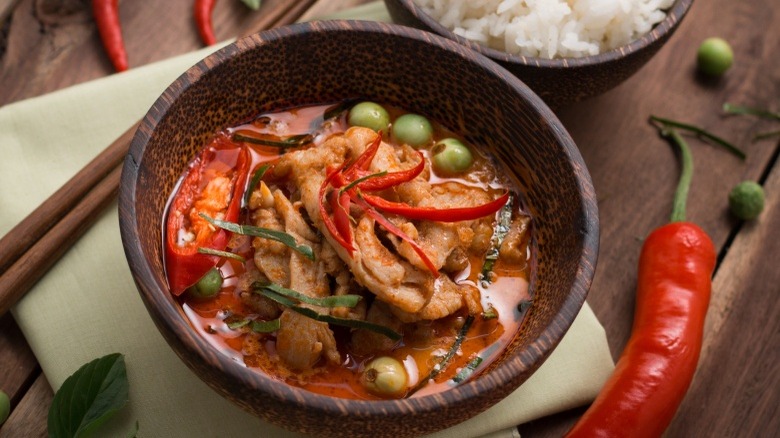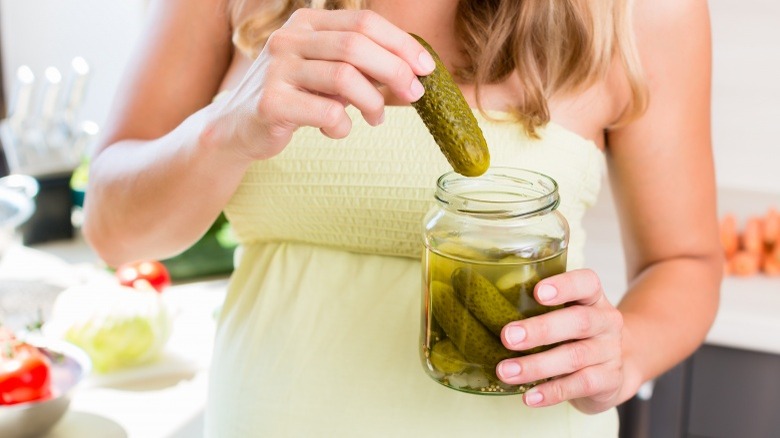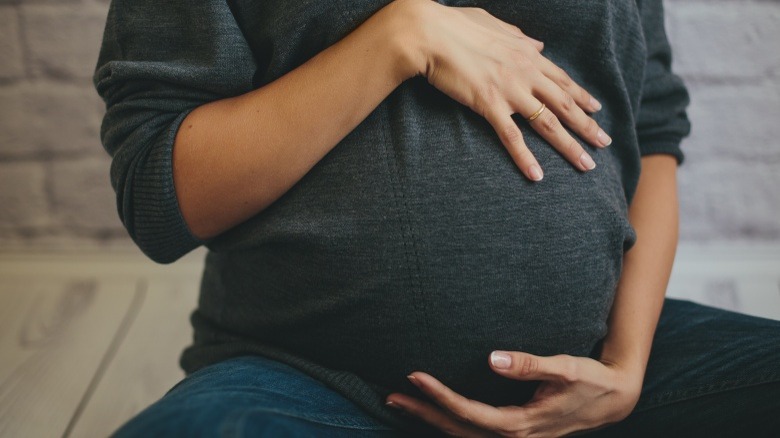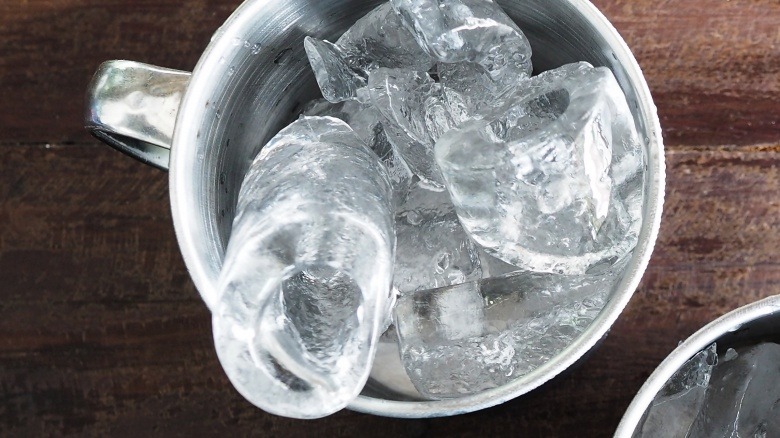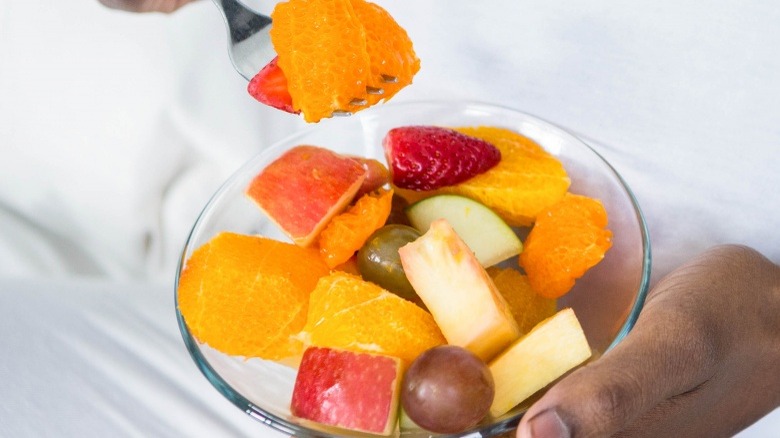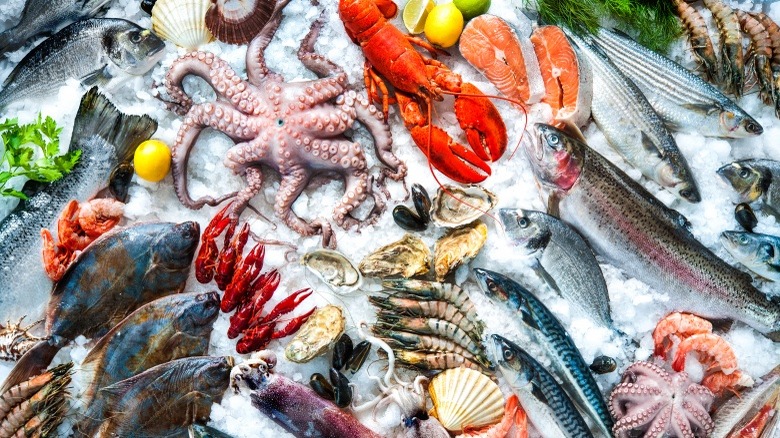Reasons Pregnant Women Have Food Cravings
There are three facts about the wonderful world of pregnancy that we all know to be true:
1. A woman can have one or more tiny humans floating around in her belly.
2. After nine-ish months, said tiny human will emerge from the woman's body — naked, bloody, and possibly crying.
3. During the nine-ish months, the woman is allowed to eat EVERYTHING she wants. No matter how weird it might be.
Okay, those pregnancy facts aren't so scientific, but it summarizes what many of us know about pregnancy, especially when it comes to eating. Food cravings are a common occurrence during pregnancy. According to a study published in the Journal of American Dietetic Association , approximately half of all U.S. women experience food cravings during pregnancy. But why do they happen? And more importantly, why do cravings make pickle juice and falafel sound like a good mix? There are many theories as to why pregnant women give into their food desires. Here are just a few wives tales, along with all the limited scientific data we were able to find on the subject.
Your baby is trying to tell you something
We're going to file this one under non-scientific: according to some popular old wives' tales, and my grandma, the type of food you crave can indicate the sex of the baby. Women who crave sweet treats, like chocolate and candy, or dairy products, especially milk, are likely to have a bouncing baby girl. Women who have a hankering for salty, spicy, or sour foods are carrying a boy.
You're overheated
When you have a bun baking in your oven, you tend to get hot. Really hot! According to some wise mamas, the best way to cool down is to eat something hot. That's why so many pregnant women crave spicy foods. There isn't much scientific evidence to definitively explain why your local Indian restaurant is packed with pregnant women, but the reasoning is sound. Eating super spicy foods causes you to sweat, which ultimately cools you off. That explains why so many of the hottest places on earth have equally spicy dishes.
Your baby wants some variety
There isn't really much scientific evidence to back this up, but some believe cravings for sour foods like lemons or salty foods like pickles, is your body getting a variety of nutrients your baby needs. This could also explain why so many women crave strange combinations like pickles dipped in peanut butter. Maybe you need more sodium — via the pickle — and more protein — via the peanut butter. Why your baby just doesn't ask for a turkey burger? Well, she doesn't have a refined palate just yet.
You might have a nutritional deficiency
Some pregnant women find themselves craving non-food items like rocks, clay, or paper; this is an actual condition called pica. The exact reason for these cravings is unknown, but according to the Journal of the Academy of Nutrition and Dietetics, pica might be linked to iron deficiency. Pica in pregnancy is more common among African Americans, immigrants in the US, and women living in rural areas. Consuming items like dirt and clay can be extremely harmful to both mom and baby, so it is recommended women who exhibit a desire to eat those non-nutritive substances consult with a physician.
You might be anemic
Similar to pica, many women find comfort in eating ice when they are pregnant. The exact reason why ice is a preferred non-food item is unknown, but many believe it is also related to an iron deficiency. Eating ice due to an iron deficiency might sound strange — especially since many people associate anemia with feeling cold. According to the Mayo Clinic, symptoms of iron deficiency anemia include fatigue, tiredness, inflammation of the tongue, and a desire to eat non-nutritive items like ice. Why ice? Well, it is believed that the ice helps reduce the tongue swelling and inflammation. And its crunchy.
Your hormones are out of whack
Pregnancy tends to play ping-pong with your hormones. Scientists believe neuropeptide Y (NPY), an amino acid produced by neurons in the sympathetic nervous system to increase your appetite, might be behind your hormone-related pregnancy food cravings. According to a study published in the journal Endocrinology , NPY production increases during pregnancy causing expectant moms to want Cheetos dipped in French vanilla ice cream. Well, maybe not those items specifically, but you get the idea. NPY is in all of our bodies — whether we're pregnant with a human, or just a massive food baby. Typically, a small amount of NPY goes from the hypothalamus to various regions of your brain to increase your appetite. However, researchers have found obese people have chronically high levels of NPY.
Your body might need some Omega-3
Many women report craving fish and other types of seafood. The answer is pretty simple: your body is probably lacking Omega-3 fatty acids. This is a common deficiency, particularly among pregnant women. For many years, women have been warned against eating fish because of the potential for mercury poisoning. Mercury is a highly toxic heavy metal that concentrates in fish through water pollution. Fish that live longer and are higher on the food chain like shark and mackerel tend to have higher concentrations of mercury.
In 2014, the US Food and Drug Administration and the Environmental Protection Agency updated their recommendations on seafood to now state that breastfeeding women, women who are pregnant or may become pregnant, and young children should eat more seafood to gain important health and developmental benefits. The key is to avoid eating fish that are high in mercury. According to the Pregnancy and You blog at the Mayo Clinic, women and children should increase their intake of low-mercury seafood, including shrimp, pollock, salmon, tilapia, catfish and cod. Alternately, avoid four types of fish associated with higher mercury levels, including tilefish, shark, swordfish and king mackerel.
It's all in your head
It's easy to search for scientific or pseudo-scientific reasons for why expectant women crave certain foods, but the answer might be simpler — you crave the foods because you want them. You might think your baby is telling you he or she wants that entire box of chocolate, but in actuality, you want that whole box of chocolate, and since you have a human growing inside of you, it is now acceptable to eat that chocolate without getting the stink eye.
Culture plays a huge role in how your cravings are perceived. In America, the image of husbands making 1 a.m. runs to a 24-hour grocery to buy a pint of chunky monkey is commonplace. That's why women in other cultures experience food cravings but with different foods. A study of pregnant Tanzanian women found about 23 percent craved mangoes, one-fifth yearned for yogurt, 15 percent desired plantains, and 13 percent wanted soft drinks.
No matter the reason for the food cravings, it's recommended not to overindulge. The Institute of Medicine reports there was a 25 percent increase in the number of US women that gained more than 40 pounds during pregnancy from 1990 to 2003. That extra weight — referred to as excessive gestational weight gain — can have serious health effects on the mom and the baby, including increased risk of gestational diabetes, preeclampsia, and delivery complications.


